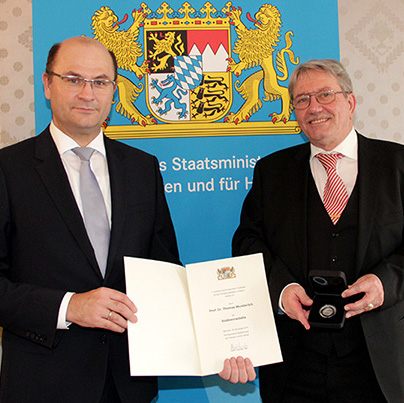Karl Rinner Price 2018
The awarding ceremony took place on October 22, 2019, in the frame of a public meeting of the ÖGK at the Federal Office of Metrology and Surveying (BEV), Vienna.
Following the laudator speech by Univ.Prof. Johannes Böhm, the former PhD supervisor of Dr. Andreas Hellerschmied, Univ.Prof. Norbert Pfeifer, president of the ÖGK, presented the award and DI Christian Lidl of the Bundeskammer der ZiviltechnikerInnen handed over the price cheque.
After the awarding ceremony Dr. Andreas Hellerschmied presented his research topic: Satellite-Tracking with VLBI.
Zum Download:
- Curriculum Vitae
- Awarded publikation: Hellerschmied et al. (2018) – Observing APOD with the AuScope VLBI Array
- Presentation
- Publication in the Österreichische Zeitschrift für Vermessung und Geoinformation (VGI) – in german
Abstract:
Observing APOD with the AuScope VLBI Array
Abstract: The possibility to observe satellites with the geodetic Very Long Baseline Interferometry (VLBI) technique is vividly discussed in the geodetic community, particularly with regard to future co-location satellite missions. The Chinese APOD-A nano satellite can be considered as a first prototype—suitable for practical observation tests—combining the techniques Satellite Laser Ranging (SLR), Global Navigation Satellite Systems (GNSS) and VLBI on a single platform in a Low Earth Orbit (LEO). Unfortunately, it has hardly been observed by VLBI, so major studies towards actual frame ties could not be performed. The main reason for the lack of observations was that VLBI observations of satellites are non-standard, and suitable observing strategies were not in place for this mission. This work now presents the first serious attempt to observe the satellite with a VLBI network over multiple passes. We introduce a series of experiments with the AuScope geodetic VLBI array which were carried out in November 2016, and describe all steps integrated in the established process chain: the experiment design and observation planning, the antenna tracking and control scheme, correlation and derivation of baseline-delays, and the data analysis yielding delay residuals on the level of 10 ns. The developed procedure chain can now serve as reference for future experiments, hopefully enabling the global VLBI network to be prepared for the next co-location satellite mission.













